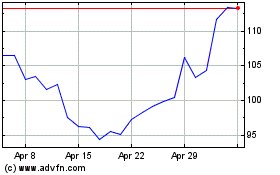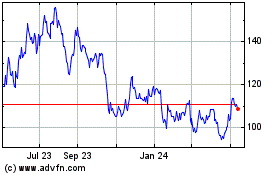China's Meituan-Dianping Raises $3.3 Billion
January 19 2016 - 9:40AM
Dow Jones News
China's top online seller of movie tickets and restaurant
bookings raised $3.3 billion in the largest private fundraising
round ever for a venture capital-backed startup.
Valued at over $18 billion by the fundraising, Meituan-Dianping,
formed by the merger of two rival startups last year, said Tuesday
it raised the fresh capital from investors ranging from Chinese
Internet giant Tencent Holdings Ltd. to venture capital investor
DST Global and Singapore state investment firm Temasek Holdings
Pte. Ltd.
China's growing importance to venture capitalists and startup
investors is underscored by the massive fundraising. The Meituan
fundraising, which started last year before the merger, tops a $3
billion round raised by Chinese homegrown ride-hailing startup Didi
Kuaidi Joint Co. to become the largest single funding round on
record for a privately-held startup with venture capital
investors.
Meituan's fundraising was complicated by growing competition in
online-to-offline services market where Chinese search leader Baidu
Inc. and Chinese e-commerce giant Alibaba Group Holding Ltd. are
spending billions on their own offerings. After sounding out
investors on a fundraising last year at valuations as high as $20
billion, investors pushed Meituan to lower its asking price and
encouraged the merger with rival Dianping to cut spending on
subsidies.
The merger with Dianping opened the door for Meituan and its
founder, serial entrepreneur Wang Xing, to form a new alliance with
Chinese social-and-gaming company Tencent at the expense of
Alibaba. The merger with Dianping diluted the ownership stake of
Alibaba, which was an early investor in Meituan. When the merger
was agreed upon, Tencent offered to put in around $1 billion as
part of the $3.3 billion fundraising to boost its ownership in
Meituan-Dianping.
Many investors viewed the merger agreement as favorable to
Dianping's existing shareholders, according to people familiar with
the situation. As a result of the Meituan-Dianping merger, Alibaba
decided to sell its roughly $1 billion stake in the startup.
Alibaba had already signaled its desire to refocus on its own
online-to-offline operations, called Koubei. Alibaba was offering
the stake ownership, which represented around 7% of the company, at
a discount to the current fundraising round. The discount was due
to its shares having less downside protection rights than the new
shares sold in this round.
Meituan-Dianping's offerings are in some ways similar to the
group-buying and restaurant-booking services sold by Groupon Inc.
and Yelp Inc. of the U.S. The company said Tuesday that its total
transaction volume had reached 170 billion yuan ($25.8 billion)
last year.
The sales of such services have grown bigger in China than the
U.S. given the country's urban megacities and the widespread
adoption of smartphone technologies. Steep discounts, particularly
on movie tickets, have been a major driver of Meituan's growth.
China's Internet giants have sought to expand their shares of
the fiercely competitive market for smartphone applications
connecting users with brick-and-mortar services such as taxi rides,
food deliveries, restaurant bookings and movie ticketing.
Many startups have burned out in the battle to attract users
with heavy discounts and subsidies, but the likes of Alibaba and
Tencent say they have deep pockets and supporting services such as
maps, data and payments platforms to give them an edge over other
competitors.
Alibaba's executives have said the company's dominance in
e-commerce can translate to success in the offline, local-services
niche, pointing to the heavy traffic of hundreds of millions of
users of its shopping app, Taobao, and affiliated payments
business, Alipay. The company also has a mapping arm and other
assets that can support such a business, they have said.
Rather than run its own operations, Tencent's strategy has been
to take minority stakes in other technology companies and use the
alliances to offer a wider range of services on the company's
messaging and social-networking applications, which also have
hundreds of millions of users.
Search company Baidu Inc., sometimes called China's Google, has
also been spending heavily to win share in the market because it
views the services as blending in with its lucrative search and map
business to increase revenue through commissions from
merchants.
Gillian Wong contributed to this article
Write to Rick Carew at rick.carew@wsj.com
(END) Dow Jones Newswires
January 19, 2016 09:25 ET (14:25 GMT)
Copyright (c) 2016 Dow Jones & Company, Inc.
Baidu (NASDAQ:BIDU)
Historical Stock Chart
From Mar 2024 to Apr 2024

Baidu (NASDAQ:BIDU)
Historical Stock Chart
From Apr 2023 to Apr 2024
